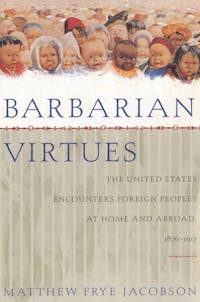Barbarian Virtues
The United States Encounters Foreign Peoples at Home and Abroad, 1876-1917
 Download image
Download image
ISBN10: 0809016281
ISBN13: 9780809016280
Trade Paperback
336 Pages
$20.00
CA$24.50
The years in between the Centennial Exhibition in 1876 and World War I were a period of dramatic change, when the dynamics of industrialization rapidly accelerated the rate at which Americans were coming in contact with foreign peoples. In Barbarian Virtues, Matthew Frye Jacobson draws upon political documents, novels, travelogues, academic treatises, and art to demonstrate the close relationship between immigration and America's newly expansionist ambitions. This keenly argued and persuasive history recasts American political life and shows how today's attitudes about "Americanism"—from Border Watch to the Gulf War—were set in this crucial period.
Reviews
Praise for Barbarian Virtues
"[Jacobson] at once pushes forward the internationalization of American history and provides a new paradigm for a period enormously difficult to pull together . . . In its breadth of vision, its succinct characterizations, and its vivid prose, Barbarian Virtues offers a bold international revision of the period between 1876 and 1917."—Leslie Butler, Reviews in American History
"Ironies abound in Jacobson's brilliant refashioning of the story of the American experience with immigration and empire . . . Barbarian Virtues is a masterly synthesis of a number of traditional and recent scholarly works on immigration . . . Jacobson sought to craft a 'new narrative of the period.' He has succeeded admirably in this goal, and his book deserves a wide readership."—Edward P. Crapol, College of William and Mary, The Journal of American History
"When Theodore Roosevelt and William McKinley meet O. Henry and Edgar Rice Burroughs, the result is this superb, highly imaginative study of how Americans fused overseas imperialism with their dislike of foreigners—and fear of new immigrants—to create the beginnings of the American Century. Too much of this account, especially sections on the Chinese and the 'China Market' of about 1900, reads uncomfortably like newspaper stories of a century later."—Walter LaFeber, Cornell University
"In this lively, fluent, broadly conceived work, Matthew Jacobson reminds us of the importance of the turn-of-the-century immigration and empire. In the process, he makes a compelling argument—important to scholars and general readers alike—about the origins of modern American nationalism."—Michael Hunt, University of North Carolina at Chapel Hill
"Jacobson's brilliant and original synthesis fully captures the complex relationship between American imperialism and immigration at the end of the nineteenth century. Here is a masterfully woven tapestry of quests for foreign markets and cheap domestic labor; of Tarzan and travelogues, eugenics and IQ tests; of 'assimilating' foreigners and anxiously brutal overseas conquests. Beautifully written, it deserves the widest readership, for it tells us who we are."—Gail Bederman, Notre Dame University
rd
"Masterful and compelling. Jacobson shows how necessary it is to understand the dynamic international context in which Americans have forged a national identity. He challenges us to redraw the map of America at the end of the nineteenth century as its borders were crossed by imperial expansion abroad and an influx of immigrants at home."—Amy Kaplan, Mount Holyoke College
"[Jacobson] marshals an array of cultural sources . . . to argue that American attitudes toward immigration and expansionism were two sides of the same coin . . . [His] reach is ambitious, touching on everything from anti-Chinese legislation to eugenics to the Philippines War."—Helen Fessenden, The Washington Post Book World
"A thoughtful analysis of America's uneasy relationship with foreignness."—Kirkus Reviews
"An excellent look at an aspect of U.S. history not often discussed or studied."—Vanessa Bush, Booklist


